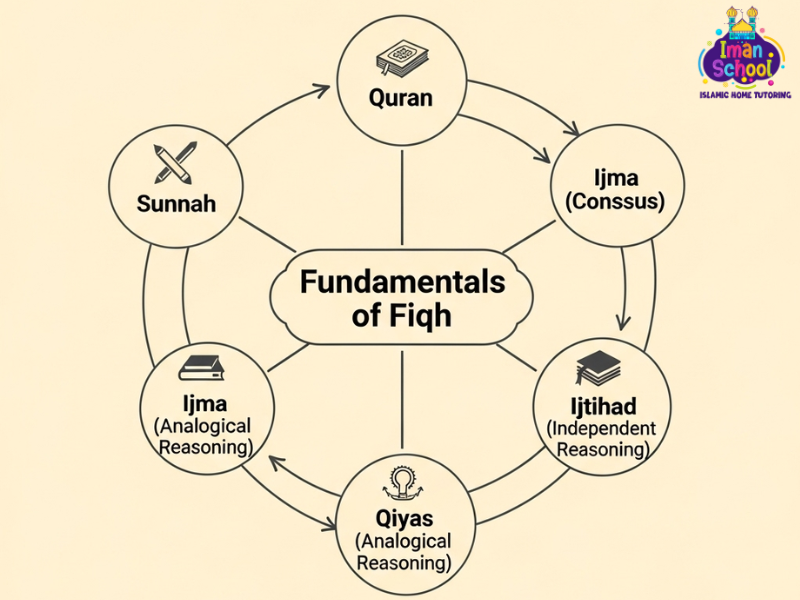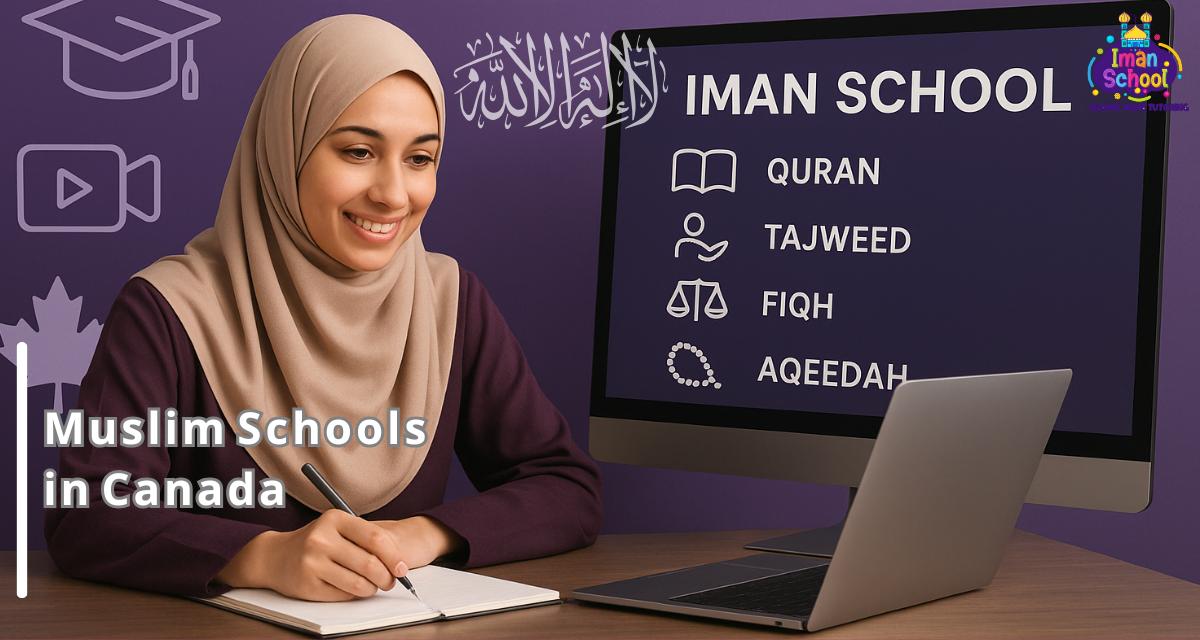Have you ever wondered about the "why" behind Islamic practices? Why do we pray five times a day, and how exactly should we perform our ablution? The answer lies in the Fundamentals of Islamic Jurisprudence (Fiqh). Fiqh is the science that provides the practical framework for all acts of worship and daily life, ensuring our actions are in line with the Quran and Sunnah.
What is Fiqh? A Simple Explanation for Beginners
What is Fiqh in Islam? In short, Fiqh is the deep understanding of the practical rulings of Islamic law. While the Shariah is the broad, divinely revealed code of conduct, Fiqh is the human effort of scholars to derive detailed rulings from the primary sources of Islam, namely the Quran and the Sunnah of the Prophet Muhammad (peace be upon him).
Think of Shariah as the blueprint and Fiqh as the architectural plan that allows us to build and live according to that blueprint. For anyone looking to learn Fiqh online, understanding this fundamental distinction is the first step.

The Importance of Learning Fiqh in Your Daily Life
Learning the Fundamentals of Islamic Jurisprudence is a personal obligation for every Muslim. It empowers you to perform your acts of worship correctly and live your life in a manner that is pleasing to Allah.
For Muslims in countries like Canada, America, Australia, and the UK, where cultural practices may not always align with Islamic law, a solid grounding in Fiqh is essential. It provides a clear, reliable guide for navigating personal, social, and professional life.
A good online Fiqh classes program will equip you with the knowledge to make informed decisions and practice your faith with confidence.
Key Branches of Fiqh
Fiqh is a vast science, traditionally divided into different branches to cover all aspects of a Muslim's life.
-
Fiqh of Worship ('Ibadat): This is the most crucial branch for every Muslim. It covers all matters of ritual worship, including purification (Taharah), prayer (Salat), fasting (Sawm), charity (Zakat), and pilgrimage (Hajj). Studying the Fiqh of Worship is a requirement for every believer to ensure their acts of devotion are valid.
-
Fiqh of Transactions (Mu'amalat): This branch deals with financial and commercial dealings, such as sales, rentals, loans, and other contracts.
-
Fiqh of Family (Munkahat): This branch covers marriage, divorce, and family life.
-
Fiqh of Punishments (Jinayat): This branch deals with criminal law and its prescribed punishments.
Learning these branches of Fiqh is essential for living a complete Islamic life.
Fiqh vs. Shariah: What's the Difference?
This is a common point of confusion for many beginners. The distinction between Shariah vs Fiqh is simple yet profound. Shariah is the divine, unchangeable law revealed by Allah, found in the Quran and the Sunnah.
It encompasses all aspects of life, from faith and morality to law and ethics. Fiqh, on the other hand, is the human effort to understand and apply the Shariah. It is the scholarly interpretation and detailed rulings derived from the sources of Shariah.
While Shariah is one, Fiqh can vary between different schools of thought (Madhabib) due to different interpretations of the evidence. Understanding this difference is a key component of any comprehensive Islamic law courses.
Online Fiqh Classes: The Best Way to Get Started
For busy students, professionals, and parents, online Fiqh classes offer a flexible and accessible way to start your learning journey. Instead of searching for a local class, you can access a reputable online Islamic school with a structured curriculum and certified teachers from anywhere in the world.
This is especially beneficial for Fiqh classes for adults who need to fit their studies around a demanding schedule. The best programs offer a path for a complete understanding of the principles of Islamic law from the comfort of your home.
When looking for the ideal online program, Iman School stands out as an excellent choice. Our curriculum is designed to simplify complex topics, making the Fundamentals of Islamic Jurisprudence accessible to all.
We provide a structured environment to learn Fiqh online, ensuring a comprehensive and authentic educational experience.

Finding a Qualified Online Fiqh Teacher
The quality of your teacher is paramount. A great online Fiqh teacher is a certified scholar who can break down complex topics into simple, understandable concepts. They should have a strong understanding of usool al fiqh (the methodology of jurisprudence) and be able to teach you how to derive rulings from the Quran and Hadith and Sunnah.
You might consider a private Fiqh tutor online for personalized, one-on-one attention. This allows the teacher to tailor the curriculum to your specific needs and questions.
When choosing an academy, look for one that offers qualified teachers with a strong background in Hadith and Fiqh. At Iman School, our tutors are rigorously vetted and hold degrees in Islamic sciences, ensuring you receive authentic knowledge from a reliable source.
Essential Fiqh Rulings Every Muslim Should Know
A best online Fiqh course for beginners should cover these core rulings that are essential for daily practice:
-
Rules of Wudu (Ablution): The conditions, steps, and what invalidates Wudu.
-
Rules of Ghusl (Ritual Bath): When it is obligatory and how to perform it correctly.
-
Correct Prayer Timings and Method: How to perform the five daily prayers in detail.
-
Recitation in Prayer: Knowing what must be recited and what is optional.
-
Conditions for Fasting: The integrals and what breaks the fast during Ramadan.
-
Rules of Zakat: How to calculate Zakat on wealth and when to pay it.
-
Rules of Menstruation for Women: The rulings on purity and worship during a woman's cycle.
-
Permissible and Impermissible Foods: A basic understanding of halal and haram foods.
-
Fiqh of Transactions: The basics of what is permissible in business dealings.
-
Fiqh of Marriage: The conditions for a valid Islamic marriage (Nikah).
A good course will start with these fundamentals, providing a strong base for new and experienced Muslims alike. This makes the course a perfect option for Islamic studies for reverts and Fiqh for new Muslims.
How Online Fiqh Classes Work: A Step-by-Step Guide
Online Fiqh classes are designed to be interactive and easy to use, even for those with no prior online Islamic education experience.
-
Find a Reputable Academy: First, choose a trusted online school that offers a free online Fiqh course trial.
-
Take a Trial Class: Book your free online Fiqh course to meet a tutor and get a feel for the platform.
-
Personalized Plan: Your tutor will assess your current level and create a customized lesson plan for your goals.
-
Live Interactive Lessons: Join your live, one-on-one video session with your tutor. You can ask questions, get instant feedback, and progress at your own pace.
-
Review and Practice: After each class, you will have access to lesson materials and practice exercises to reinforce what you've learned.
Fiqh for Beginners: A Reading and Resource List
To supplement your Fundamentals of Islamic Jurisprudence classes, a beginner should explore a variety of resources. You can start with simple books and articles that explain the principles of Islamic law in an easy-to-understand format. A good tutor will recommend specific books.
Many online Islamic school platforms also provide their own structured resources and materials to guide you. This helps new students in their journey to understanding Islamic jurisprudence for beginners.
The Role of Ijtihad in Fiqh
A critical part of Fiqh is Ijtihad (إِجْتِهَاد), which means "independent reasoning" by a qualified scholar to derive a ruling on a new issue. The scholars of the past used Ijtihad to formulate the different schools of Fiqh.
Today, Ijtihad is carried out by contemporary scholars to address modern issues that were not present at the time of the Prophet (PBUH).
This shows that Islamic law is not stagnant; it is dynamic and continues to be relevant for all times and places. Understanding this concept is essential for a deep understanding of usool al fiqh.
Get to know:
- Can You Read Quran Without Ghusl?
- Does a woman have to wear hijab when reading quran
- Why Can't Muslim Woman Pray on Their Period?
Explore Our Fiqh Courses
Learning the Fundamentals of Islamic Jurisprudence is the key to unlocking a life of clarity, purpose, and spiritual fulfillment. A thorough understanding of Fiqh is what turns your worship into a meaningful act of devotion.
Iman School is a premier online Islamic school that provides the best online Fiqh course for students around the world. Our certified teachers, comprehensive curriculum, and flexible online Islamic education platform make us the ideal choice for anyone looking to start their journey.
We offer Fiqh for new Muslims and advanced courses for students in Canada, America, Australia, the UK, and beyond.




